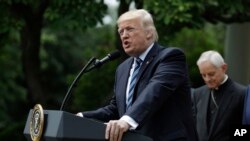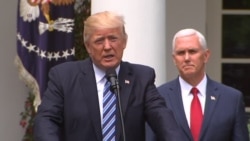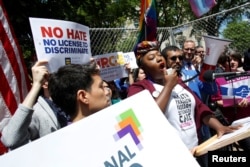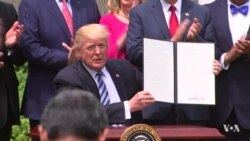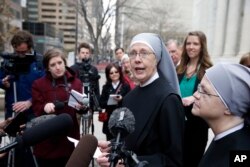President Donald Trump has loosened the government's enforcement of a rule that bars tax-exempt churches from participating in political activity.
Trump signed an executive order Thursday that gives "maximum enforcement discretion" to the country's tax agency, the Internal Revenue Service, in tracking the ban on political activity by religious groups, an edict that already is rarely enforced.
"If a pastor, priest or imam speaks about issues of public or political importance, they are threatened with the loss of their tax exempt status — a crippling financial punishment," Trump said Thursday. His executive order directs the IRS not to enforce the Johnson Amendment, which prohibits religious organizations and charities from endorsing political candidates.
Trump's order also gives "regulatory relief" to conservative religious groups that object to provisions of the national health care reforms advocated by former President Barack Obama that required them to pay for health insurance plans that cover birth control and other measures that they feel go against their religious beliefs.
Birth control insurance coverage
Trump signed the order on religious liberties as he greeted Christian conservatives at the White House on what has been designated as the National Day of Prayer. Exit polls during last November's presidential election showed Trump defeating Democrat Hillary Clinton by a 5-to-1 margin among evangelical Christians, and he promised this niche of voters that he would address their concerns about government policies when he assumed power.
“Our founding fathers believed that religious liberty was so fundamental that they enshrined it in the very first amendment of our great and beloved Constitution," Trump said in a Rose Garden ceremony. "Yet for too long, the federal government has used the power of the state as a weapon against people of faith, bullying, and even punishing Americans for following their religious beliefs, that’s been happening. That is why I am signing today an executive order to defend the freedom of religion and speech in America, the freedoms that we’ve wanted, the freedoms that you fought for so long.
"We will not allow people of faith to be targeted, bullied, or silenced anymore," Trump declared. "And we will never ever stand for religious discrimination. Never ever.”
The order, however, does not include a controversial provision in a draft that circulated in Washington earlier this year that could have allowed federal contractors on the basis of faith to discriminate against lesbians, gays, bisexuals, transgendered people and single mothers.
No legal challenge expected
In previewing Trump's order, a White House official said, "All laws still apply. Anything that would currently be illegal under current law would still be illegal; we're not changing the law. No one's suggesting that churches can take out political ads."
The official said the White House was not expecting a legal challenge to the order since it is not changing the law. But within an hour of Trump signing his executive order, the American Civil Liberties Union said it would immediately file suit over it.
Watch related video
“America is a deeply religious country because religious freedom and tolerance of divergent religious views thrive," said ACLU executive director Anthony Romero. "President Trump’s efforts to promote religious freedom are thinly-veiled efforts to unleash his conservative religious base into the political arena while also using religion to discriminate. It’s a dual dose of pandering to a base and denying reproductive care. We will see Trump in court, again.”
The order offers a guiding principle of the Trump White House, "that it is the policy of the administration to protect and vigorously promote religious liberty."
Trump's edict aims to weaken the already lax enforcement of a tax regulation that was put into effect in 1954 and was named after then Senator Lyndon Johnson, who later became a U.S. president in the 1960s. It prohibited partisan political activity for churches and other tax-exempt organizations. It allows a wide range of advocacy on political issues, such as support or opposition to abortion or gay rights, but bans outright political endorsements from the pulpit.
The rule has rarely been enforced, however, and only one church is known to have lost its tax-exempt status, in 1992, when a New York church took out newspaper ads calling for the defeat of presidential candidate Bill Clinton, who nonetheless was elected that year.
Despite lax enforcement of the rule, conservatives have long called for its repeal, saying it inhibits free speech.
The "regulatory relief" Trump is granting on the health law could benefit groups like the Little Sisters of the Poor, a religious order that has objected to paying for birth control costs in health insurance plans for women who work in the nursing homes the group operates.




